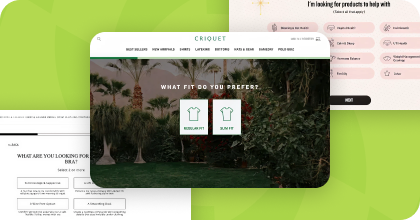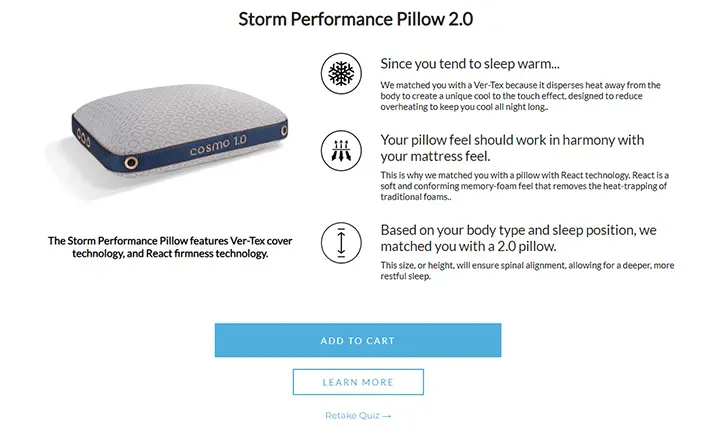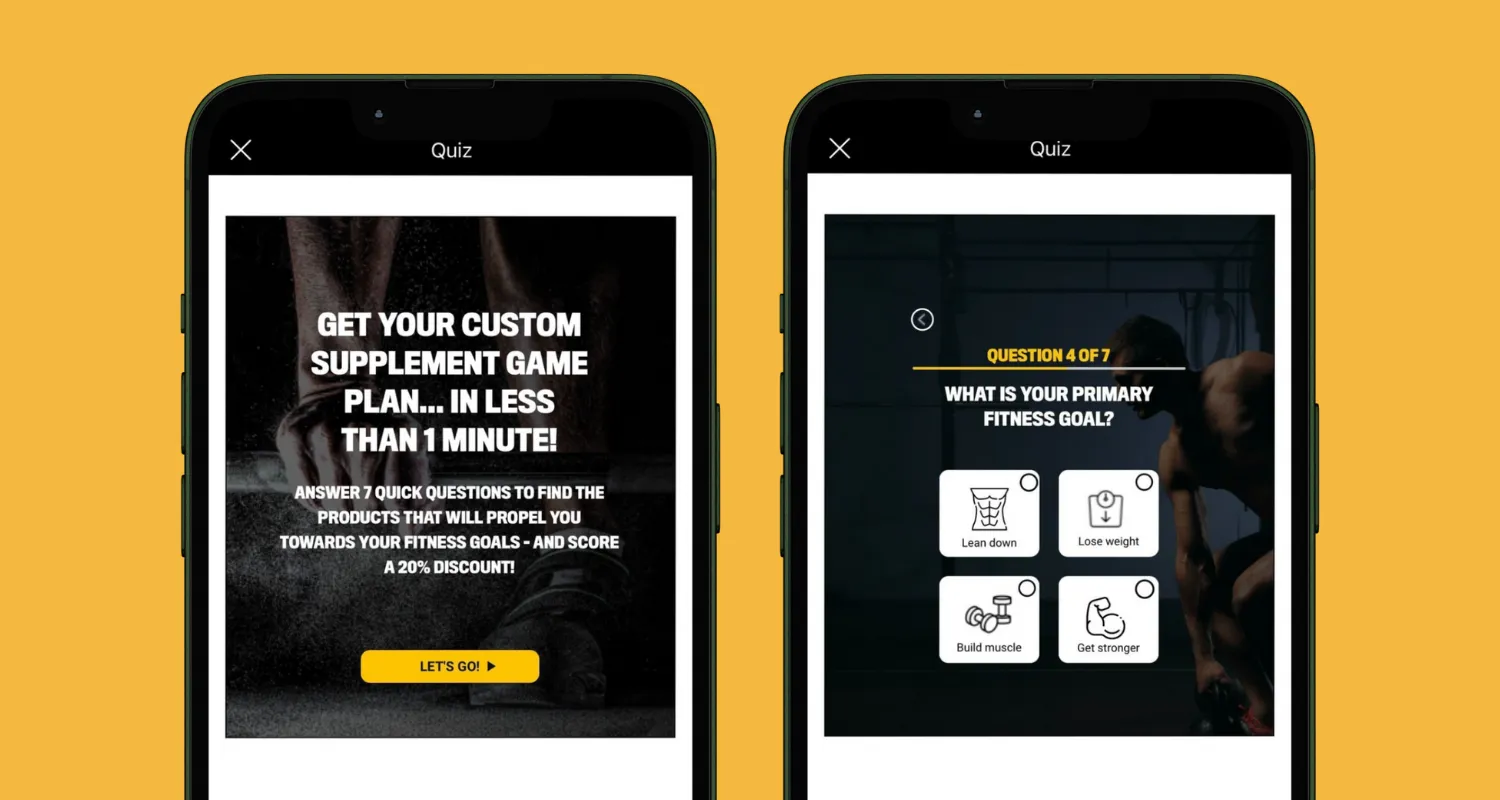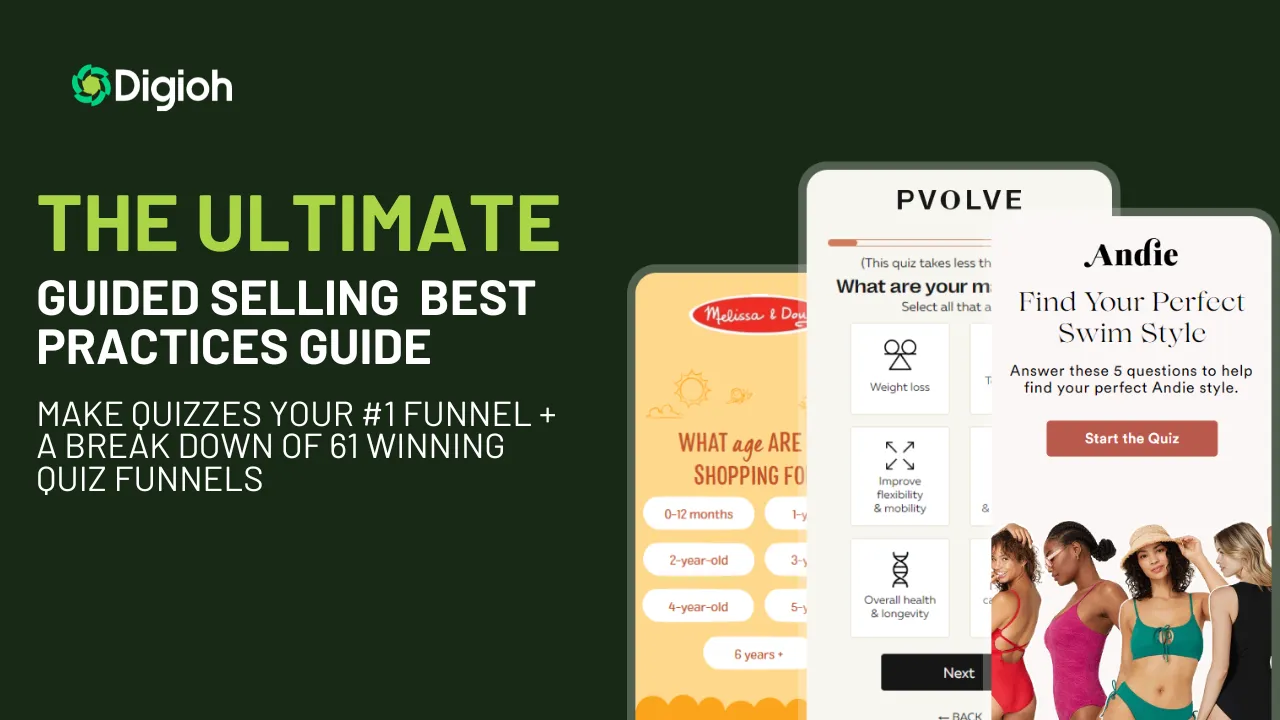March 5, 2025
Learn how to create Shopify quizzes that drive sales and capture customer data with personalized product recommendations.


Steal High-Converting Ideas From Leading DTC Brands
Browse 50+ real examples of personalized marketing funnels you can replicate today.
Online shopping can be overwhelming—too many choices, not enough guidance. That’s where Shopify quizzes come in. These interactive experiences help shoppers find exactly what they need, leading to higher conversions and happier customers. For eCommerce brands, personalization has evolved significantly - what was once considered a luxury feature has now become a standard expectation.
This shift toward personalized shopping experiences has proven valuable, as it demonstrably enhances both customer satisfaction and long-term loyalty to the brand.
Take BedGear, who saw a staggering 490% increase in rates. They’re a performance bedding brand found in 4,000 retail stores globally. They implemented their PillowID quiz to help online shoppers find their perfect pillow match based on sleeping positions. temperature preferences, and body type.
The results were remarkable:

You probably want similar results for your store, right? Join us as we walk you through why you need quizzes and how to get them up and running.
Keeping customers engaged in eCommerce can be tough. Using quizzes has become an effective way to make online shopping more interactive while increasing customer engagement and happiness–which often translates to more sales.
These Shopify quizzes create customized experiences that speak to customers by asking questions based on their preferences. This makes for a great shopping journey and a way to build long-term relationships with customers.
Quizzes excel at simplifying the customer's shopping journey by turning a potentially overwhelming browsing experience into a fun and delightful adventure. Customers are taken through a series of questions that lead to personalized product recommendations based on their unique needs and preferences. This customization increases the chance of conversion as customers feel valued and understood.
This approach has been beautifully demonstrated by Andie Swim, a women's swimwear company that boosted their average order value by 21% through making the typically stressful swimsuit shopping experience into something enjoyable and personalized. Their interactive quiz asks shoppers about body type, style preferences, and Intended use of the swimwear.
Results achieved:
This comprehensive approach to guided selling improved sales metrics, reduced return rates, and increased customer confidence in their purchases.

Think of a shopper looking for the perfect skincare product. Instead of wading through a long list of options, they're guided through quiz questions about their skin type, concerns and desires. The result is a curated list of products that match exactly what they need, making their decision making process easy and fulfilling. This targeted personalization can increase customer happiness and sales as customers are more likely to buy when offers are customized for them.
Customers have plenty of options these days. This often leads to hesitation or even abandoning their carts. To combat this, personalized product recommendations from quizzes can play a big role. By tailoring suggestions through answers in these quizzes they reduce some of the mental load of decision making.
This challenge was particularly notable for CrazyBulk, a fitness supplement company with a wide range of products for different fitness goals. Their customers were often overwhelmed by the supplement options and uncertain which would best suit their specific needs.
After implementing a guided selling quiz through Digioh:

Imagine a scenario where a customer engages with a product recommendation quiz that asks about their preferences and requirements. It then generates a list that matches those exact criteria. Such targeted help enables customers not only to quickly find the right product but also overall satisfaction during their digital shopping journey through an interactive product quiz.
By reducing the options and focusing on more relevant choices through personalized recommendations from these quizzes there's an opportunity for retailers to see increased conversion rates and sales figures—capitalize on streamlined customer experiences that make buying easier.
In a world where data privacy is a top concern, quizzes offer a compliant way to collect direct insights from customers—without relying on cookies or third-party tracking. Zero-party data has become a valuable asset for eCommerce businesses. This kind of data differs from third-party data where customers provide brand information via quizzes. Zero-party data stands out because it gives direct insight into what customers prefer which allows businesses to implement more effective and targeted marketing.
Businesses can use quizzes to collect zero-party data and create customized marketing communications with a quiz kit. For example, a quiz about a customer's skincare habits can reveal individual needs and preferences that marketers can use when crafting personalized promotional campaigns or interacting with their audience.
Using zero-party data enables businesses to comply with data privacy regulations and build trust with their customers by showing respect for data privacy. To create an effective quiz for your Shopify store, you need to approach it methodically. The goal isn't just to ask a set of questions; the goal is to create an interactive experience that will captivate and motivate customers to buy.
Following established guidelines is key to crafting a successful quiz that resonates with and appeals to your audience. In this section we'll go into basic strategies for building engaging and effective quizzes such as setting clear objectives, ensuring mobile responsiveness, writing great questions, using imagery to boost engagement and evaluating results for future iterations.

The transformation that the health supplements brand Obvi, with an increased AOV of 34%, experienced when it revamped its quiz approach illustrates how important thoughtful quiz design can be.
Initially, Obvi struggled with:
After switching to Digioh, they were able to create:
Obvi now integrates their quiz prominently on their website and promotes it to their Facebook community of 100,000 members, making it a central part of their customer experience strategy.

Following these proven techniques will result in a quiz that engages customers deeper and reveals insights into their preferences and behavior. We will look into how to define clear goals, devise question sequences that keep user interest and provide individualized results per customer interaction. Integrate quizzes seamlessly onto your platform and optimize for performance across different mobile devices.
To create an effective Shopify quiz the first step is to define clear goals and tactics. By setting specific objectives that align with your broader marketing strategy and your target audience you'll ensure your quiz serves its purpose. Whether you want to generate leads, increase sales or segment your customer groups differently—a defined goal will guide both the creation and execution of your Shopify quiz.
In scenarios where lead generation is the priority then integrating questions into the quiz that can capture essential customer information—like their email addresses—is crucial. On the other hand if sales is the top priority then incorporating elements into the quiz that will offer personalized product recommendations can greatly increase conversion rates.
Starting with questions that address directly to what troubles or interests customers will keep them engaged from start to finish as they go through each question in the Shopify quiz.
Keeping user engagement with a question flow is key to keeping them interested and getting high completion rates for your quiz. Make sure the quiz is concise and relevant and will encourage users to see it through to the end.
To create an engaging question flow:
This increases the chance they'll complete your quiz.
Personalized results are a powerful way to increase user satisfaction and sales. By using data from customers' quiz answers, you can give them product recommendations that cater to their unique needs and preferences. Such precision in personalization can really improve the overall shopping journey and increase the chances of a sale.
Integrating quizzes into your eCommerce site and marketing platforms is key to maximizing their impact. By placing quizzes on landing pages, product detail pages and pop-ups you can engage users more and keep them interested. Syncing quizzes with email marketing systems enables strategic post-quiz communications with leads.
Placing a quiz on a landing page is a great lead capture mechanism by getting visitors' email addresses while offering personalized product recommendations based on their preferences. When quizzes are connected to email marketing platforms it streamlines the process of communicating with prospects and guides them towards making a purchase.
Since many online shoppers access content on mobile devices, it's important to make sure your quizzes are mobile-friendly. Making quizzes responsive and ensuring a user-friendly experience on handheld devices can improve overall user experience and increase completion rates. Testing across different mobile platforms ensures compatibility and usability, so customers have a seamless experience.
For example, when designing a skincare quiz, navigation should be considered for users on smartphones. This means clear questions that are easy to interact with. By optimizing for accessibility on various mobile devices, you're providing a positive experience for every customer, no matter what device they use.
It's important to track key metrics when evaluating your Shopify quizzes. Keeping an eye on metrics like completion rates, lead generation rates, engagement levels and their impact on Average Order Value (AOV) and Customer Lifetime Value (CLV) allows you to gain insight into how well your quizzes are performing. These insights will highlight areas that need refinement and allow you to fine tune your quiz strategy for better results.
The rate at which participants complete the quiz is an important indicator of its engagement. If a high percentage of people are completing the quiz it's often a sign they find it interesting and relevant. This could increase customer involvement and get more accurate data on their product preferences. For best results in driving sales you should target a completion rate of 90-100%.
Monitoring how many people see the quiz through to the end will give you an idea of its length and suitability for your audience. If fewer people are completing the quiz it may be too long or not interesting enough. By tracking these rates regularly you can make changes to better tailor the user experience and increase overall satisfaction with your service.
Monitoring quiz success in lead capture and conversion rate is key to evaluating its impact on sales. By adding a quiz that asks for customer information such as their email address you can boost lead generation. This data provides an opportunity for targeted marketing and follow up.
By presenting personalized product recommendations through a quiz customers are steered towards making quicker purchase decisions which can increase conversion rates. Tracking both lead capture and conversions will give you insight into how quizzes are driving sales and where you can improve.
The time customers spend on quizzes and the click-through rate on quiz results pages are key indicators of engagement and satisfaction. These metrics are directly linked to customer satisfaction which can drive sales. Monitoring these numbers is key to evaluating your quizzes for users and to make changes for better performance.
A lot of time spent on quizzes and high click-throughs to view quiz results mean the content is interesting and relevant to them. Evaluating these engagement rates allows you to fine tune the quiz experiences to increase interest and conversion rates.
Looking at the impact of quizzes on financial metrics like AOV and CLV can reveal the long-term benefits of adding quizzes to your online store. By providing individualized product recommendations quizzes can increase AOV as customers buy products that cater to their unique needs. For example a quiz that recommends a full skincare regimen for a customer's skin type could result in higher order value as customers add multiple suggested products to their cart.
Quizzes create a stronger bond with customers through personalized engagement and targeted marketing which in turn increases CLV. Customers who engage with these quizzes regularly show higher levels of involvement which translates to more frequent purchases and overall higher lifetime value.
Using quizzes also allows companies to collect zero-party data from participants. With this information brands can enhance upsell and cross-sell tactics and customer loyalty – all contributing to higher AOV and CLV.
Building a Shopify quiz can seem daunting, but follow these steps, and you’ll be crafting a quiz that engages customers and converts. Building a quiz with Digioh is a straightforward process that involves several key steps. Here's a comprehensive guide on how to create an effective product recommendation quiz using Digioh:
Digioh offers two main types of quiz logic:
To set up your logic:
Ready to start with quizzes for your Shopify store? Book a demo of Digioh and see how we can help you grow your store with quizzes, pop-ups, and more.
In summary, quizzes provide personalized product recommendations that resonate with customers but also provide insights to inform future marketing and product development.
The success stories of brands like BedGear, Andie Swim, Obvi, and CrazyBulk clearly demonstrate how effective quiz implementation can transform an eCommerce business:
The numbers speak for themselves. Whether you're selling performance bedding, swimwear, health supplements, or fitness products, a well-designed quiz can guide customers to the perfect product match while simultaneously gathering valuable data to fuel your marketing efforts.
Brands like Obvi, Andie Swim, and BedGear have transformed their conversions with quizzes. Want to see how? Book a demo and start guiding your customers to the perfect products today.
Zero consumption based pricing with zero limits allows your brand to deploy Digioh across your entire marketing funnel.
book a demo
